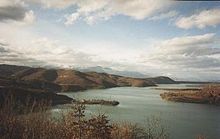Dibra
Dibra ( Albanian also Dibër , Macedonian Дебар Debar , Turkish Debre ) is a section of the Drin Valley in the border area between North Macedonia and Albania .
The high valley is surrounded on all sides by high mountains: in the north lies the Korab Mountains , the main summit of which is 2764 m above sea level. A. is the highest point in both countries. The mountains also reach heights of over 2000 meters in all other directions. The Black Drin flows from the south through a narrow gorge into the valley and leaves it again through a similarly deep gorge. The river used to be notorious for its annually recurring floods, which is why there is hardly a village near the narrow river bed. Since the construction of a reservoir on the north Macedonian side, the Debarsko Ezero , the water level has been regulated.
The dibra is fertile. Wolves and bears still live in the great forests . Large parts of the population work in agriculture . You have a reputation for being hardworking and successful.
After the fall of the Ottoman Empire , the major European powers laid down the borders of the new state at the London Ambassadors' Conference . The Dibra region was cut through. The north-western part, also called Little Dibra , was assigned to Albania. The Great Dibra around the city of Debar (Albanian: Dibra / Dibër ) went to Serbia (now North Macedonia). The city lost a large part of its sphere of influence. Families were separated and the residents on the Albanian side could no longer go to the market in Debar. On the Albanian side, the city of Peshkopia became the new regional center and capital of the region that today forms the municipality of Dibra .
Dibra is mostly inhabited by Albanians . They speak a Gegic dialect. Slavic Macedonians also live on both sides of the border . The Albanian population in this region is traditionally Muslim .

